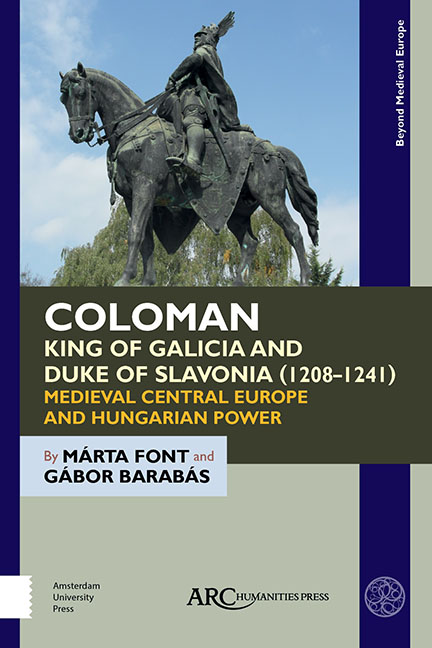 Coloman, King of Galicia and Duke of Slavonia (1208–1241)
Coloman, King of Galicia and Duke of Slavonia (1208–1241) Book contents
- Frontmatter
- Contents
- List of Illustrations
- Foreword
- Introduction
- PART ONE COLOMAN AS CHILD RULER OF GALICIA
- Chapter 1 The Galician Context in 1205
- Chapter 2 The Agreement of Scepus
- Chapter 3 Coloman’s Coronation as King of Galicia: Date and Place
- Chapter 4 The Hungarian Elite and Coloman’s Court
- Chapter 5 Coloman’s Position in Halych, 1215–22: Campaigns and Opponents
- Chapter 6 Upholding the Galician Claim: Coloman’s Place in Hungary
- PART TWO COLOMAN, DUKE OF WHOLE SLAVONIA (1226–1241)
- Chapter 7 Coloman and Scepus, Before 1226
- Chapter 8 Coloman as Duke of Whole Slavonia from 1226
- Chapter 9 Coloman’s Status and the Inner Workings of the Duchy
- Chapter 10 Coloman’s Ecclesiastical and Secular Actitivities in Slavonia
- Chapter 11 Coloman’s Rule in Slavonia
- Chapter 12 Politics and Dynastic Affairs
- Chapter 13 Challenges in the Balkans
- Chapter 14 The Mongol Attack and Coloman’s Death
- Conclusion: Coloman in the Eyes of Posterity
- Bibliography
- Index
Chapter 11 - Coloman’s Rule in Slavonia
Published online by Cambridge University Press: 20 November 2020
- Frontmatter
- Contents
- List of Illustrations
- Foreword
- Introduction
- PART ONE COLOMAN AS CHILD RULER OF GALICIA
- Chapter 1 The Galician Context in 1205
- Chapter 2 The Agreement of Scepus
- Chapter 3 Coloman’s Coronation as King of Galicia: Date and Place
- Chapter 4 The Hungarian Elite and Coloman’s Court
- Chapter 5 Coloman’s Position in Halych, 1215–22: Campaigns and Opponents
- Chapter 6 Upholding the Galician Claim: Coloman’s Place in Hungary
- PART TWO COLOMAN, DUKE OF WHOLE SLAVONIA (1226–1241)
- Chapter 7 Coloman and Scepus, Before 1226
- Chapter 8 Coloman as Duke of Whole Slavonia from 1226
- Chapter 9 Coloman’s Status and the Inner Workings of the Duchy
- Chapter 10 Coloman’s Ecclesiastical and Secular Actitivities in Slavonia
- Chapter 11 Coloman’s Rule in Slavonia
- Chapter 12 Politics and Dynastic Affairs
- Chapter 13 Challenges in the Balkans
- Chapter 14 The Mongol Attack and Coloman’s Death
- Conclusion: Coloman in the Eyes of Posterity
- Bibliography
- Index
Summary
WE CAN GET a good insight into Coloman's internal policy in Slavonia from two charters from 1229, though we can also see that occasionally his actions involved neighbouring lands. The first such action concerning a former donation, the second an order to the count of Split regarding actions against pirates off the Dalmatian coast. It is remarkable that the duke was involved in an issue outside Slavonia, but this was not a single incident since he also delivered a judgement in a law-suit concerning the social status of certain royal men in Zala County that same year. We learn about this case because the duke issued a charter confirming an agreement between the Cistercian abbey of Topusko and certain laymen in September 1234. The litigants were required to pay a fine to Coloman, if they failed to follow the settlement. Two diplomas of 1239 offer further details on the ducal adjudication. Both charters of Arnold, count of Zala, contain references to the role of the pristaldus of King and Duke Coloman. The Latin term refers to an obsolete practice in Hungarian law, linked to oral testimony, the pristaldi being in effect both summoners and official witnesses at the same time. The duke was being represented, it seems, beyond the core territory of Slavonia by his agents. One of his own charters from 1229 also seems to confirm this practice.
A 1231 disposition from Coloman shows his attitude towards western European settlers in his duchy, as he regulated the privileges and duties of these “guests” (hospites) in Vukovar; they were given safety on an estate of the castle. This ordinance shows not only ducal policy, but reveals the nationality of the settlers: Germans, Hungarians, and Slavs were included, though we should be cautious about any such ethnic statements. King Béla IV confirmed his brother's disposition in May 1244, as did his son, the younger king Stephen, in 1263.
Coloman was involved in a similar affair in 1234. He determined the privileges and the required services of the hospites in the villages of Virovitica (Verőce).
- Type
- Chapter
- Information
- Coloman, King of Galicia and Duke of Slavonia (1208–1241)Medieval Central Europe and Hungarian Power, pp. 99 - 104Publisher: Amsterdam University PressPrint publication year: 2019


